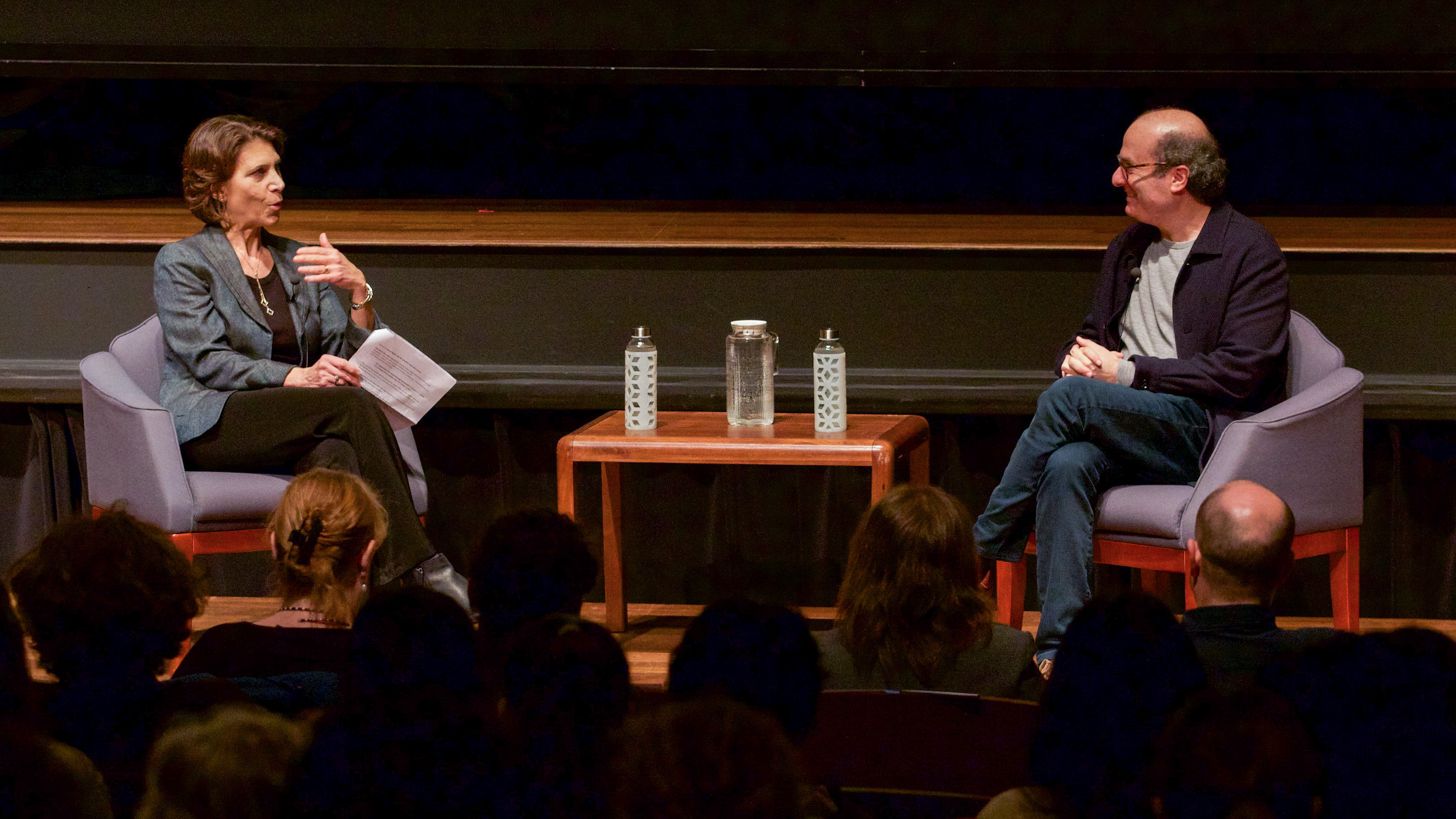David Grann finds the stories that follow the themes of human nature. Whether it be an unsolved murder case or a shipwreck from 300 years ago — Grann immerses his reader so deeply into a story due to his thorough reporting.
Grann, a staff writer for the New Yorker and the author of best-selling books such as “Killers of the Flower Moon,” “The Wager” and “The Lost City of Z” spoke to BU students and faculty about his work alongside Debbie Danielpour, a film and television professor in the College of Communication.

Brian McGrory, the department head of Boston University’s journalism program, said Grann was “the best narrative nonfiction writer alive” at the Tsai Performance Center on Wednesday night during “An Evening with David Grann,” a discussion held by BU’s Conversations in the Arts & Ideas.
Despite all of his accomplishments, Grann said he’s not a natural writer, and he’s lucky if he writes even 500 words in a day.
Grann, a Graduate School of Arts and Sciences alum, gave the audience insight into his writing process. While writing “Killers of the Flower Moon,” Grann slept in a tent in the Oklahoma prairies to experience the conditions of his characters sleeping in tents on those same prairies. And obviously, it paid off: the film adaptation based on the book was nominated for nine Academy Awards.
However, he said immersing himself in stories makes the process easier.
“It’s the only way I can report and write, it’s the only way I can learn,” Grann said in an interview with The Daily Free Press. “That’s the only way I feel I can do justice to the stories.”
Grann said he often has conversations with the “ghosts” or the people he writes about.
“They’ll often go on for ages, and you can’t shut them off,” Grann said. “I spent so much time with these people that … inevitably they invade your space and consciousness. In fact, if anything, you’re trying to find ways to shut it out sometimes because otherwise you can go a little crazy.”
“Killers of the Flower Moon” — Grann’s most known book about a series of murders in the early 1920s, wiping out the Osage people, a Native American tribe in Oklahoma. It took him over five years to investigate and write the story. Grann said, during the event, he came into the book completely fresh, with no ties to Indigenous tribes or knowledge other than what he had learned in school.
James Johnson, the chair of BU’s History Department and an Oklahoma native said the same — he never learned in school about the dispossession of Native Americans in his home state. He said it wasn’t until he went to graduate school at the University of Chicago that he learned the true history of his home state.
“This was a part of my ongoing self-education, and I picked up the book and just couldn’t believe what I was reading,” Johnson, who also coordinated the event, said. “In those days, they weren’t teaching that history.”
And today, they still aren’t.
In a guest essay co-written for the New York Times by Grann and Jim Gray, a former Osage chief whose great-grandfather was killed during the Reign of Terror, the two detailed the censorship of “Killers of the Flower Moon” in Oklahoma public schools.
Grann said teachers are afraid to teach the book because of a 2021 bill prohibiting teachers in public school from teaching concepts that would cause “any individual should feel discomfort, guilt, anguish or any other form of psychological distress” on account of their race or sex.
“We’re all shaped by history,” Grann said in the interview. “There’s certain parts of our history we need to reckon with and learn from.”
BU students who attended the lecture echoed Grann’s sentiments.
“The book is important because it is this monumental piece of American history that people don’t really talk about that much,” said Julia Brukx, a senior in the College of Arts and Sciences.
Brukx said as a history major, seeing Grann succeed has inspired her.
“Students who are at the event can imagine him their age, in class and walking alongside Bay State Road and writing in the dead of the night,” Johnson said.
Johnson said that Grann speaking at the event was a last-minute decision. He said halfway through watching the “Killers of the Flower Moon” movie, he slapped his “forehead and said, ‘David Grann has to be our guest.’”
“I sent him an email on a Sunday night, and he wrote back on a Monday morning and said, ‘I’d love to do it,’” Johnson said.
For Grann, he said he looks back on his experience at BU with fondness, as it’s where he learned a lot about writing.
Grann called himself a “professional snoot” and said he will always be on the lookout for more stories.
“I finish a project that’s consumed me for so long, and I go, ‘What am I going to do next? And I’m kind of at a loss,” Grann said. “The truth is, there’s no system for it. There’s no pattern for when that great story hits you because you’re looking for it, and I look for it all the time.”
CORRECTION: A previous version of this article said the film adaptation of David Grann’s book “Killers of the Flower Moon” won nine Academy Awards. The film is currently nominated for nine. The updated article reflects this change.




















































































































Barry Fitzsimmons, COM ‘85 • Mar 2, 2024 at 5:29 pm
Quick note on “the film adaptation based on the book won nine Academy Awards.” Those are still just nominations, but best of luck to Scorcese and team for this exceptional film.